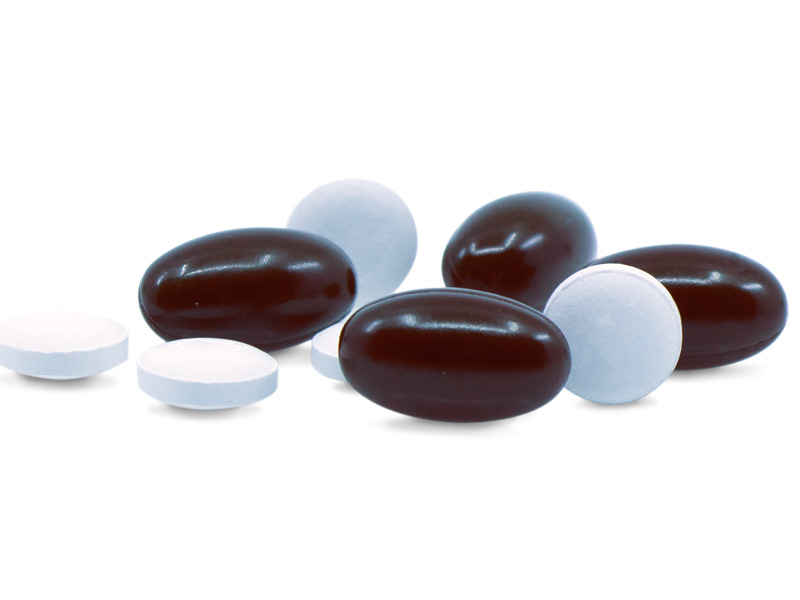Coenzyme Q10 and selenium in combination. The KiSel-10 Study researchers were curious to see whether the long-term supplementation of senior citizens with Coenzyme Q10 and selenium had had a significant effect of blood levels of the Fibroblast Growth Factor 23 hormone. Fibroblast Growth Factor 23 levels may provide useful information about heart function and about the prognosis in cases of cardiovascular disease [Alehagen Feb 2022].

In the KiSel-10 sub-study summarized here, Prof. Urban Alehagen and a team of researchers investigated the influence of supplementation for four years with Coenzyme Q10 and selenium on the level of FGF-23 and its relationship with cardiovascular mortality during 10 years of follow-up in an elderly Swedish population.
Note: Fibroblast Growth Factor 23 is a hormone that is involved primarily in the metabolism of vitamin D and phosphorus. There is, however, scientific evidence that blood Fibroblast Growth Factor 23 concentrations may provide relevant information for cardiologists [Alehagen 2022].
The sub-study results showed the following associations [Alehagen Feb 2022]:
- Combined supplementation with Coenzyme Q10 and selenium was associated with a significantly lower level of Fibroblast Growth Factor 23, compared to placebo supplementation [Alehagen Feb 2022].
- During 10 years of follow-up, study participants who later died a cardiovascular death had had significantly higher blood FGF-23 levels compared with study participants who survived [Alehagen 2022].
- Study participants who had normal kidney function had significantly lower blood FGF-23 concentrations than study participants who had impaired renal function.
Background of the KiSel-10 Study
Researchers administered Coenzyme Q10 in the form of ubiquinone (2 times 100 mg/day) and selenium yeast (200 mcg/day) or matching placebos to community living senior citizens (average age: 78 years) for 48 months [Alehagen 2013].
Outcomes of the KiSel-10 Study
The combined CoQ10 and selenium yeast supplementation was associated with the following clinical effects [Alehagen Sep 2022]:
- improved cardiac function
- less cardiac wall tension
- reduced cardiovascular mortality up to 12 years of follow-up
Biological Mechanisms with Impact on the Clinical Effects in the KiSel-10 Study
Sub-study analysis of the data from the KiSel-10 Study has revealed that the following underlying biological mechanisms are associated with the heart health benefits of the combined CoQ10 and selenium yeast supplementation [Alehagen Sep 2022]:
- reduced inflammation
- reduced oxidative stress
- improved insulin-like growth factor 1
- reduced fibrosis
- improved endothelial dysfunction
- reduced shortening of telomere length
- reduction of Fibroblast Growth Factor 23
Conclusion: Significantly Reduced Levels of Fibroblast Growth Factor 23
Using blood samples drawn at the start of the KiSel-10 Study and again after 48 months of supplementation with a combination of Coenzyme Q10 and selenium yeast or with matching placebos, researchers found a significantly lower concentration of Fibroblast Growth Factor 23 in the blood of the study participants who had taken the active treatment for 48 months [Alehagen Feb 2022].
The KiSel-10 study participants who took the active treatment had improved heart function and reduced cardiovascular disease mortality compared to the study participants who took the matching placebos [Alehagen 2013].
Thus, the sub-study outcome showing significantly lower Fibroblast Growth Factor 23 blood levels associated with less cardiovascular disease risk indicates an important relationship of Coenzyme Q10 and selenium with cardiovascular function and risk [Alehagen Feb 2022].
Note: The clinical efficacy of the CoQ10 and selenium supplements depend on good absorption and bioavailability. In the case of the CoQ10 supplement, the form of the Coenzyme Q10 — whether ubiquinone or ubiquinol — has been shown to be less important than the formulation of the supplement, i.e., the choice of the carrier oils in the supplement matrix and the use of precise heating and cooling procedures [Lopez-Lluch 2019].
Moreover, it is not necessary to take a ubiquinol supplement in order to raise significantly ubiquinol concentrations in the blood circulation [Mantle & Dybring 2020].
Read our key article about CoQ10 and cardiovascular health in elderly people
Sources
Alehagen U, Aaseth J, Larsson A, Alexander J. Decreased concentration of Fibroblast Growth Factor 23 (FGF-23) as a result of supplementation with selenium and Coenzyme Q10 in an elderly Swedish population: A sub-analysis. Cells. 2022 Feb 1;11(3):509.
Alehagen U, Johansson P, Svensson E, Aaseth J, Alexander J. Improved cardiovascular health by supplementation with selenium and coenzyme Q10: applying structural equation modelling (SEM) to clinical outcomes and biomarkers to explore underlying mechanisms in a prospective randomized double-blind placebo-controlled intervention project in Sweden. Eur J Nutr. 2022 Sep;61(6):3135-3148.
Alehagen U, Johansson P, Björnstedt M, Rosén A, Dahlström U. Cardiovascular mortality and N-terminal-proBNP reduced after combined selenium and coenzyme Q10 supplementation: a 5-year prospective randomized double-blind placebo-controlled trial among elderly Swedish citizens. Int J Cardiol. 2013 Sep 1;167(5):1860-6.
López-Lluch G, Del Pozo-Cruz J, Sánchez-Cuesta A, Cortés-Rodríguez AB, Navas P. Bioavailability of coenzyme Q10 supplements depends on carrier lipids and solubilization. Nutrition. 2019 Jan;57:133-140.
Mantle D, Dybring A. Bioavailability of Coenzyme Q10: An Overview of the Absorption Process and Subsequent Metabolism. Antioxidants (Basel). 2020 May 5;9(5):386.
The information presented in this review article is not intended as medical advice and should not be used as such.








I want a specific product. What do you recommend?
Hi Nancy –
Remember, I am not a medical doctor. I do not recommend any products.
For myself, I want a product with documented effect.
Here is the link to the product I take – it is available from amazon.com.
http://www.q-symbio.com/can-i-get-the-same-q10-used-in-the-study
This is the product used in the Q-Symbio study and in the KiSel-10 study.
Q-Symbio study documentation – https://pubmed.ncbi.nlm.nih.gov/25282031/
KiSel-10 study documentation – https://pubmed.ncbi.nlm.nih.gov/22626835/
Thank you for writing,
Richard